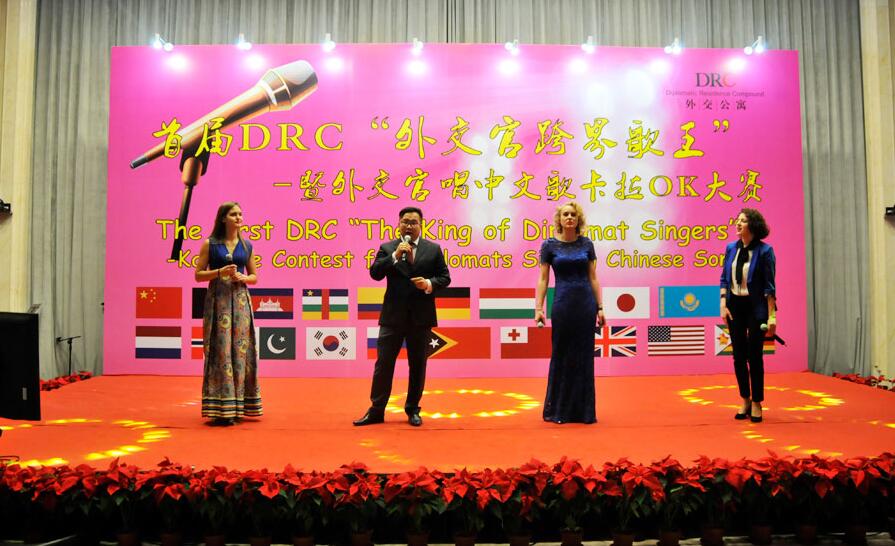Beijing’s very first Chinese karaoke singing contest for diplomats took place over the weekend at The DRC foreign affairs building and attracted more than 200 diplomats from more than 40 embassies.

Foreign diplomats sing popular Chinese songs
Every year, the Beijing Housing Service Corporation for Diplomatic Missions organizes a cultural event for diplomats and their families. This year, for the first time ever, it was a karaoke contest for diplomats to sing Chinese songs.
Twenty-five contestants hailing from 19 out of the 40 embassies here in Beijing have each selected their own songs to perform.
“I just like the song, there’s no hidden message. It’s upbeat and it’s a good song to sing to and I enjoy it so that’s why I chose it,” said Michael Graham from U.S. embassy.
The audiences and judges appeared to have enjoyed it too. But despite how it looks, Graham was not always so into Karaoke.
“Well, I never use to like karaoke, but some of my friends in China kept asking me to go and telling me what a good time it would be, and so I finally went and discovered it is a good time and I really have fun when I go out and it’s a great way to meet people,” said Graham.
Other songs brought back memories of the 2008 Beijing Summer Olympics. For Befio Paulin, who goes by “BaiFei” in Chinese, this competition is more than just a chance to win.
“Sometimes when I tell people where I am from, introduce my country, a lot of them don’t know about it. So I wanted to enter this competition to let everyone know about my country,” said Befio Paulin from Central Africa Republic Embassy.
Two of the more popular songs had been performed by former Taiwan pop star Teresa Teng, or Deng Lijun, who died in 1995 at the young age of 42 because of an asthma attack.
But even now, she is still hailed as the Queen of Chinese love songs, her most iconic one being “The Moon Represents My Heart” (“Yue Liang Dai Biao Wo de Xing”).
Jonas Volden Weltan from the Norwegian Embassy chose to sing and play a song called “Lake Baikal” by famous Chinese folk singer Li Jian, who also happened to be one of the celebrity judges.
“It’s a very beautiful song, so after I started to read the lyrics, to prepare, I felt it was very moving lyrics, about love, about the loss of love, about how time can tear down some of the bonds we have with other people. So I think it’s a very moving song,” said Jonas Volden Weltan from the Embassy of Norway.
For many people, karaoke is just a fun way to spend a Friday night out with friends. But for most of the contestants here today, it represents years of studying Chinese and months of practice to become the country’s first diplomatic Idol, or “King of Diplomat Singers.”
But it was not a king who was crowned today. It was a queen. Elisa Horhager from the German Embassy won over the judges with her rendition of “Tomorrow will be better” (“Ming Tian Hui Geng Hao”).
“The first time I heard it I was in university at Liaoning Da Xue, Laio Da in Shenyang. And our teacher proposed the song to us because she said it’s one of the most timeless Chinese songs. It's classic but still has appeal today. I really liked it that much,” said Elisa Horhager from the German Embassy.
“I also like the fact that the meaning speaks to the individual about how we will all face difficulties in our life but it will all be better and also to the collective. So it’s also about building a better society or a better nation.”
After the awards were presented, there was a group encore of the winner’s song “Tomorrow will be better.”
But there might not be an encore of this it anytime soon at Horhager’s home.
“I would sing in the shower but my son comes in and says, ‘Mom, don’t sing!’ I’m not allowed to sing at home anymore. I think he knows the song as well as I do and he’s only two and a half," said Elisa Horhager.
They might come from different countries, but all the contestants have two things in common: their passion for singing, and their love for Chinese culture.















